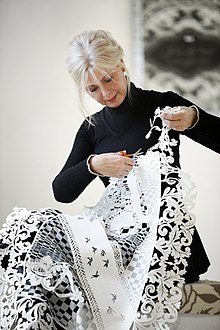Karen Bit Vejle (born June 5, 1958 in Ejby, Denmark) is a Danish papercut artist. She lived in Trondheim, Norway from 1984 to 2014, and currently lives in Denmark.
Karen Bit Vejle | |
|---|---|
 Karen Bit Vejle at work with her art of paper and air. Marjana Malkamäki. |

Work and philosophy
editVejle's primary art form is papercutting, the art of creating images made of paper by cutting patterns and pictures. She carries on a tradition from, among others, the Danish fairy-tale writer H.C. Andersen, and a technique that was important in the 1700s for silhouette portraiture. Papercut art is made from large sheets of paper and cut only with scissors. The work of creating this type of art is time-intensive and requires great concentration; a wrong cut cannot be undone.
An important figure in Vejle's artwork is "Ballerina Bulldog," an apparently delicate, but strong, ballerina. The aim of the Ballerina Bulldog concept is to provoke reflection on one's own inner strength, and increase awareness of the responsibility one has for one's own life choices.[1][2] The concept is based on Søren Kierkegaard's philosophy:
The Danish philosopher Søren Kierkegaard has said that when we walk the path of life, we come to a point where it splits in two. We have to choose, and then we move on. And when we have gone a little way, the road splits again and we can make a new and perhaps wiser choice. That is the wonderful thing.
— Karen Bit Vejle to Bergens Tidende[3]
She also creates template paintings, cutting images from one piece of paper and transferring them by painting on a second sheet (stenciling).
Career
editVejle has had installations and shows in Scandinavia, Europe, Asia and the United States. The well-known London gallery Adrian Sassoon is the main seller of her art.[4] The American Swedish Institute in Minneapolis exhibited 54 of her paper creations in a 2016 show called Papercut! The Incredible Psaligraphy of Karen Bit Vejle.[5]
In 2010 she began an artistic collaboration, "Paper dialogues," with the Chinese papercut artist Xiaoguan Qiao.[6] Both Vejle and Qiao created work depicted dragons; as Qiao put it, the "dragon’s meaning as a symbol differs depending on the culture that views it."[6] The collaboration resulted in an exhibit that was shown in many countries around the world.
Vejle is the subject of a documentary by Norwegian filmmaker Gry Molvær Hivju, "Bit Ballerina Bulldog", that was nominated for Best Documentary of the Year during at the 2015 Bergen International Film Festival (BIFF), and nominated for Best Movie Music for the Norwegian Broadcast Industry's Golden Screen award.
References
edit- ^ "Ballerina Bulldog". Museum for Papirkunst (in Danish). Retrieved 30 October 2023.
Ballerina Bulldog papercut artist Bit Vejles story of the Ballerina Bulldog is based on Kierkegaard's philosophy. The exhibit shows Ballerina Bulldog, who, with help of her power tools, takes responsibility for her dance through life. (Papirkunstner Bit Vejles fortælling om Ballerina Bulldog er baseret på Søren Kierkegaards filosofi. Udstillingen viser Ballerina Bulldog, som, med hjælp af sine power tools, tager ansvar for sin linedans gennem livet.)
- ^ video with Karen Bit Vejle who talks about Ballerina Bulldog during the exhibition at Kalmar castle in 2012 (viewed 2 June 2015)
- ^ Gorseth, Olav (21 March 2015) "Symbol-saturated paper art". In: Bergens Tidende
- ^ Adrian Sassoon's official website. Retrieved June 7, 2015.
- ^ Amy Carlson Gustafson (January 22, 2014). "Shear beauty: American Swedish Institute exhibit features Danish artist's paper cuts". Pioneer Press. Retrieved October 23, 2016.
- ^ a b Anderson, Leslie Anne (January 24, 2022). "Interview with Paper Dialogues Artist Qiao Xiaoguang". Nordic Museum. Retrieved 30 October 2023.
QX: It was great to work with Bit as a cross-cultural dialogue. We selected the same theme—the dragon (in Chinese, it is "Long")—to depict. The dragon's meaning as a symbol differs depending on the culture that views it.